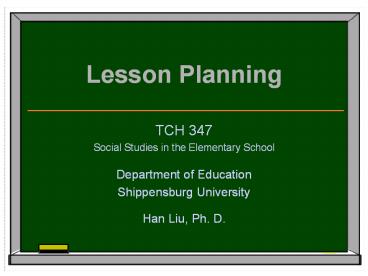Lesson Planning - PowerPoint PPT Presentation
Title:
Lesson Planning
Description:
Lesson Planning TCH 347 Social Studies in the Elementary School Department of Education Shippensburg University Han Liu, Ph. D. * * * * * * * * * * * * * * Types of ... – PowerPoint PPT presentation
Number of Views:57
Avg rating:3.0/5.0
Title: Lesson Planning
1
Lesson Planning
- TCH 347
- Social Studies in the Elementary School
- Department of Education
- Shippensburg University
- Han Liu, Ph. D.
2
Types of Lesson Plan
- Mini Lesson Plan
- Unit Lesson Plan
- Block Lesson Plan (Block Scheduling)
3
Keep in Mind When Planning a Lesson
- Goals
- Long-range desired outcomes of instruction that
give teachers a sense of direction. Usually
expressed as strands that are woven throughout
the curriculum at all or at certain grade levels. - Three Strands of Goals
- Knowledge and Cultural Understanding
- Skills Attainment and Social Participation
- Democratic Understanding and Civic Values
4
Lesson Plan Outline
- Prepare Standards
- Prepare Objectives
- Prepare Curriculum
- Prepare Students
- Prepare Learning Environment
- Prepare Technology
- Prepare Instructional Strategies
- Prepare Class Activities
- Prepare Assessment
5
Preparing for Standards
- National
- State
- District
- School
- Personal
6
Preparing Objectives
- Objectives
- Related specific and measurable outcomes sought
by teachers at each grade level. - Behavioral Objective
- Behavior (action verb)
- Performance level (criteria)
- Criteria (condition of performance)
- Cognitive Objective
- General Cognitive Objectives
- Special Cognitive Objectives
- Open Objective vs. Closed Objective
- Open objective Divergent thinking is emphasized
- Closed Objective Convergent thinking is
emphasized
7
Sample of Behavioral Objectives (1)
- Knowledge Objective Students will write
behavior a definition of stereotype similar to
the one in the textbookperformance level,
without referring to the textbook or a
dictionaryconditions. - Thinking Skill Objective Using classroom sources
other than the textbook condition, students
will generalize by writing behavior one
performance level main idea about the role of
government in a community. - Study Skill Objective Students will make
behavior a map of trails westward, using
crayons and an outline map of the United States
conditions to show three trails in different
colors performance level
8
Sample of Behavior Objectives (2)
- Value Objective Students will state behavior
the extent to which justice was upheld in a story
read by the teacher conditions, giving one
performance level reason for the judgment. - Participation Objective Students will show
sensitivity to feelings of others by always
performance level making behavior
constructive comments in group discussion
conditions.
9
Preparing Curriculum
- Text book
- Other Print/Online Materials
- Curriculum Organization
- Content Delivery
- Conceptual Structure
- Scope and Sequence
- Skills
10
Preparing Students-1
- Learning Styles
- Cognitive Styles
- Multiple Intelligence
- Personal Interests
- Special Needs
11
Preparing Students-2
- Cultural Differences
- Ethnic Differences
- Racial Differences
- Differences in Socioeconomic Status (SES)
- Linguistic Differences
- Gender Differences
- Religious Differences
- Regional Differences
- Individuality
12
Preparing Students-3
- Exceptional Students
- Gifted and Talented students
- Students with mental retardation
- Student with learning disabilities
- Students with emotional disturbance
- Students with physical impairments
- Students with hearing impairments
- Students with visual impairments
- Students with movement impairments
- Students with communication disorders
- At-risk students
13
Preparing Class Activities
- Introductory activities
- Developmental activities
- Expanding activities
- Concluding activities
- Individual activities
- Group activities
- Activities involving technology
14
Preparing Group Activities
- Whole group
- Small Group
- Committees
- The Symposium
- The Panel Discussion
- The Roundtable Discussion
- Buzz Groups
- Cooperative Learning Groups
- Decision-Making Model
- Case-Analysis Model
15
Preparing Learning Environment
16
Preparing Technology
- Reserve machines
- Test machines before class
- Alignment instructional and learning activities
with technology - Prepare rules for using technology
- Prepare backups in case of technology failure
17
Preparing Instructional Strategies
- Theoretical guidelines
- Instructional approaches
- Content/grade level appropriate methods
- Instructing, facilitating, supervising, and
directing techniques - Accommodating different needs
- Questioning techniques
- Organizing examples
- Informal assessment skills
- Developing student learning modules
18
Alignment of Standards, Objectives, Questions,
and Assessments
- National State Standards
- Behavioral Cognitive Objectives
- Convergent Divergent Questions
- Traditional Alternative Assessments
19
Alignment of Objectives, Questions, and
Assessments with Blooms Taxonomy
- Level of Objectives
- Level of Questions
- Choices of Assessment Tools (refer to PPT 3
Assessment Evaluation)
20
Alignment with KWHL Model
- What do you already know
- Student previous knowledge
- What do you want to know
- Learning objectives
- How do you know
- Procedures and activities
- What have you learned
- Assessment (formal informal)
21
Consider the Following in Lesson Planning
- Grade Level
- Subject Area
- Content Specialty
- Time Allocation
22
Want to be a Great Teacher?
- Mediocre teacher tells
- Good teacher explains
- Superior teacher demonstrates
- Great teacher inspires
23
Contents of a Generic Lesson Plan
- Standards
- Objectives
- Materials
- Procedure/Activities
- Teacher Activities
- Introduction
- Development
- Expansion
- Conclusion
- Lecturing
- Facilitating
- Supervising
- Directing
- Providing feedback
- Students Activities
- Individual activities
- Group activities
- Hands-on activities
- Activity with technology
- Data-gathering activities
- Thinking-reasoning activities
- Applicative activities
- Creative/Expressive activities
- Organizing/Summarizing Activities
- Reflection/Informal/Formal Assessment
- Assignment (Homework)































